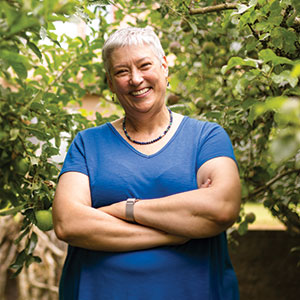-
From the Editor-in-Chief
CAR-T Cells: ‘Bionic’ Immune Cells for Treating CancerT cells are being rebuilt to kill cancer cells.
by William G. Nelson, MD, PhD
-
A Sense of Purpose
In a Facebook Live discussion about When Breath Becomes Air, Lucy Kalanithi talks about safeguarding a person’s identity in the face of terminal disease and shares tips and resources for caregiving.
by Marci A. Landsmann
-
Caregiving With Confidence
Make Your Mental Health a PriorityRecognize the signs of a serious mental illness and get help if you need it.
by Lisa O’Leary
-
Raising Their Voices
People with metastatic breast cancer are demanding to be seen, counted and included in breast cancer research.
by Sue Rochman
-
Survivor Profile
The Power of PatientsJanet Freeman-Daily helps put patients at the center of lung cancer research.
by Robin Meadows
-
Learning to Share
At first, I wanted to hide my cancer diagnosis. My son showed me what a mistake that was.
by Lenn Robbins
-
Life After Pediatric Brain Cancer
Survivors of pediatric brain or spinal cord tumors can have cognitive and physical impairments. Researchers say that these deficits can be minimized with the right interventions.
by Cheryl Platzman Weinstock
-
A New Guideline for Cervical Cancer Screening
Physicians Lee Learman and Francisco Garcia discuss the updated U.S. Preventive Services Task Force guideline and the need to increase access to cervical cancer screening.
by Anna Azvolinsky
-
Being Candid About Cancer
As a father with an aggressive brain cancer, I've opted against elaborate metaphors and in favor of candid speech when talking about cancer with my children.
by Adam Hayden
-
The Long-Term Effects of Cancer
Adolescent and young adult cancer survivors need to be monitored for delayed treatment side effects, including problems affecting the endocrine system, researchers say.
by Cheryl Platzman Weinstock
Cancer Talk
Lessons From 20 Years Living With Cancer
Multiple myeloma survivor Jonathan Gluck reflects on uncertainty, and the scientific progress that has kept him living with cancer for more than two decades.
by Eric Fitzsimmons
The Enduring Importance of Cancer Disparities ResearchOpening session from AACR conference highlights how perseverance and adversity have informed cancer disparities research over the years.
by Eric Fitzsimmons
Most Cancer Survivors Don’t Meet Healthy Diet GoalsDespite research linking fruits and vegetables to cancer survival, many people do not change their eating habits after diagnosis.
by Darlene Dobkowski
Many People Don’t Get Colonoscopy After Receiving Abnormal Blood TestsAbout half of people who receive abnormal results from colorectal cancer screening tests don’t follow up with a colonoscopy.
by Laura Gesualdi Gilmore















